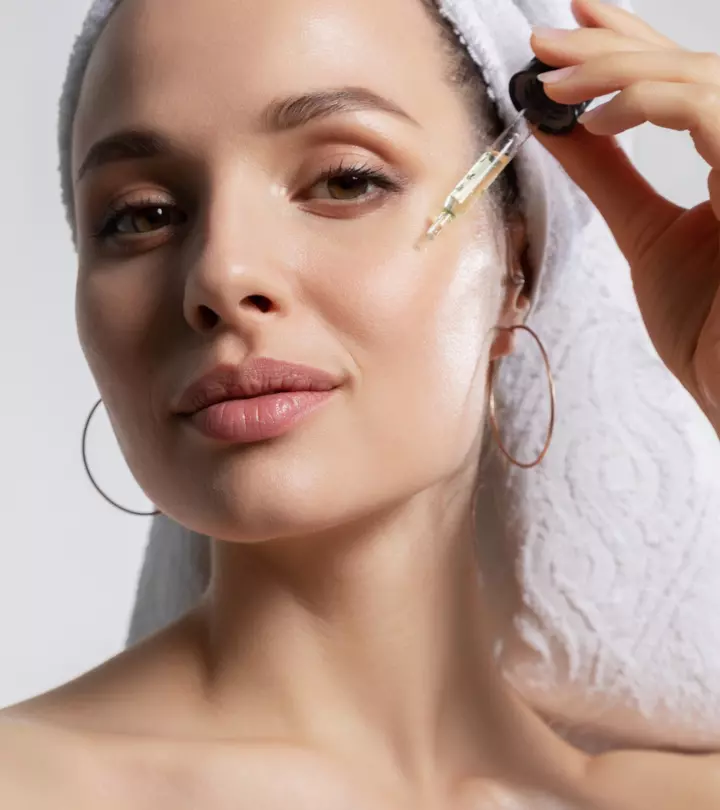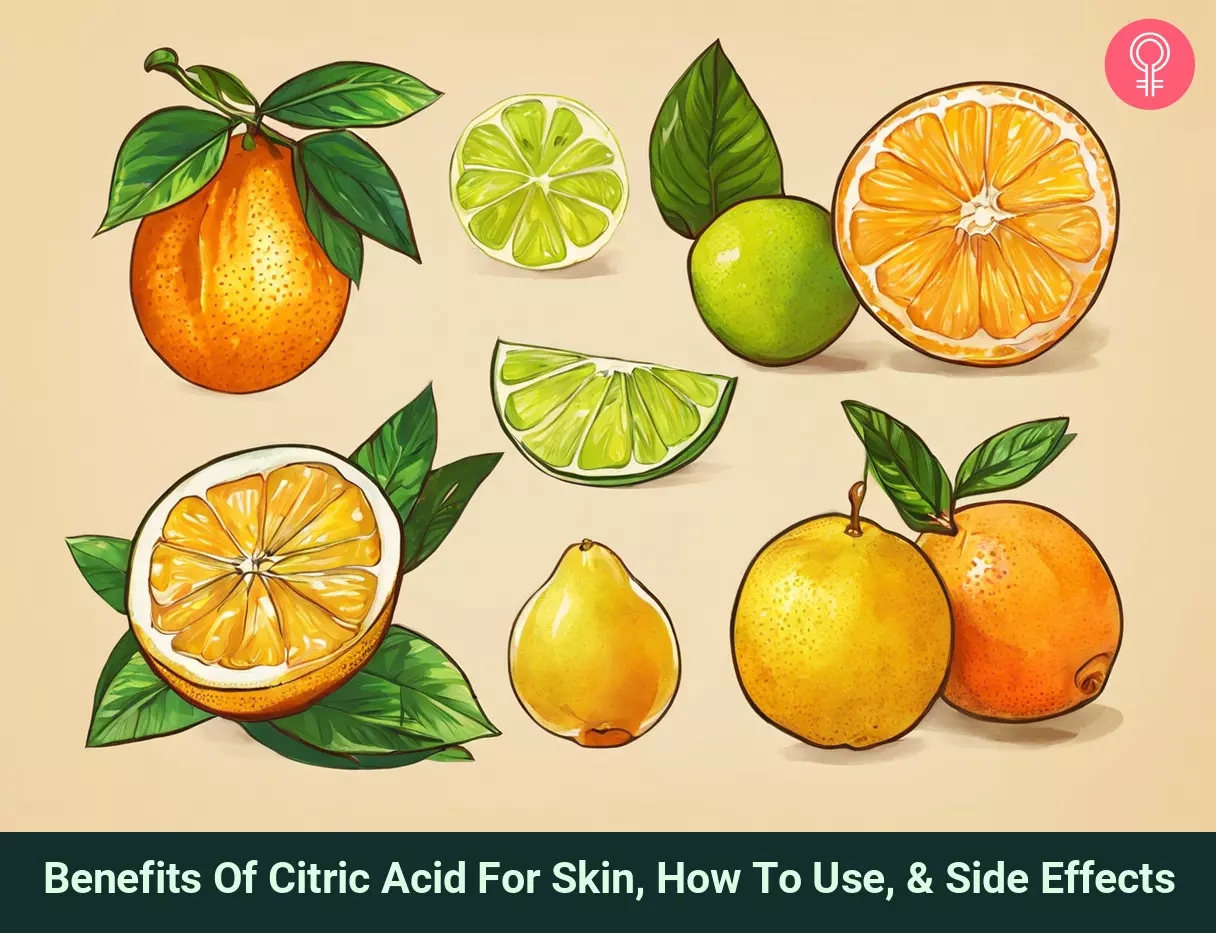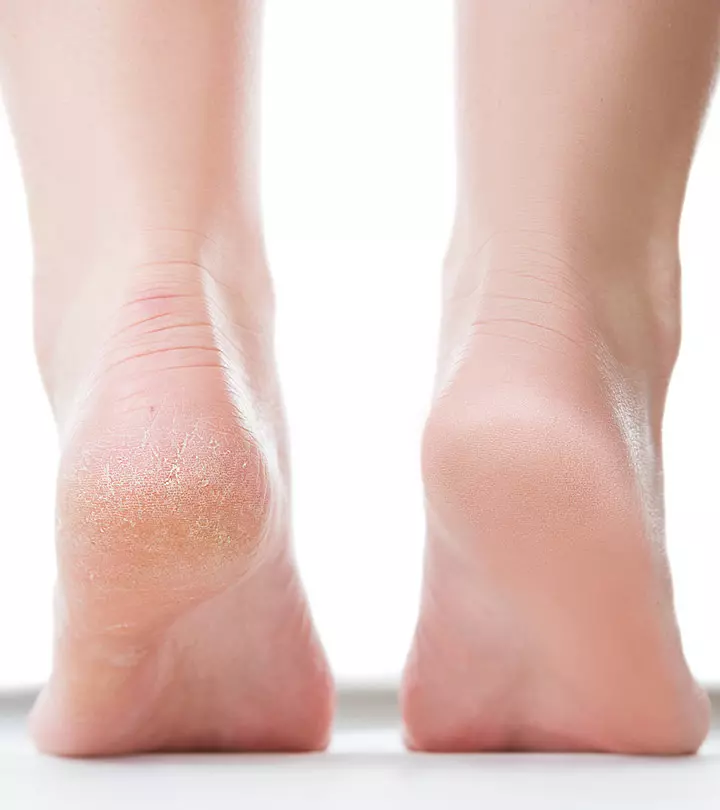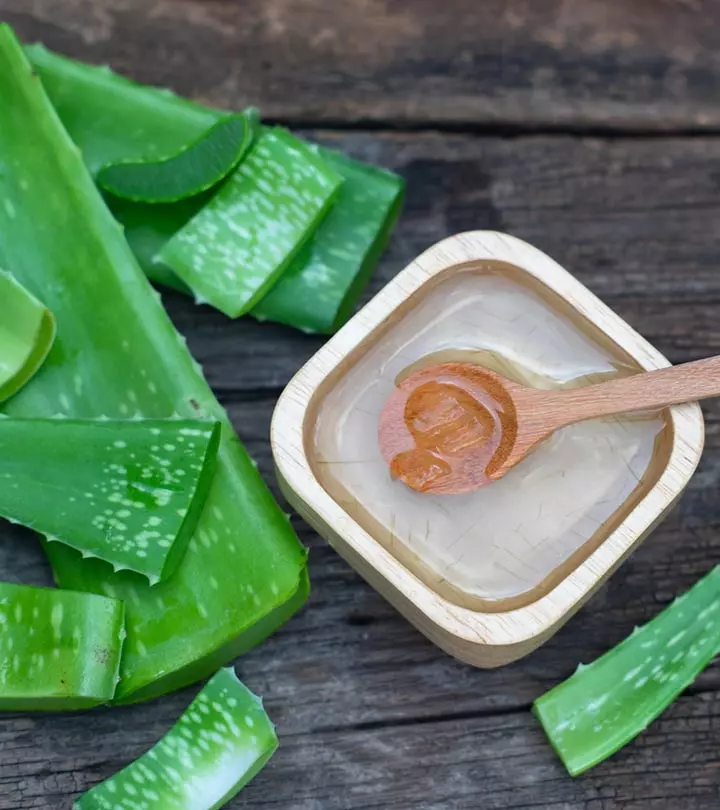Benefits Of Citric Acid For Skin, How To Use, & Side Effects
From improving elasticity to exfoliation - this acid is your answer for radiant skin.

Image: Shutterstock
Using citric acid for skin is not something new. It has been a common ingredient in DIY personal care products, beauty treatments, and household cleaners for ages. It is a natural alpha hydroxy acid (AHA) and is well-known for its exfoliating, brightening, and anti-aging benefits. Properly incorporating it into your skin care routine can improve its results and contribute to healthier, more radiant skin. But the bigger question remains, is citric acid really an effective option to improve your skin?
In this article, we have listed the benefits of citric acid, potential risks, how to use it, and who should avoid using it. Read on!
 Know Your Ingredient: Citric Acid
Know Your Ingredient: Citric AcidWhat Is It?
An alpha hydroxy acid naturally occurring in citrus fruits.
What Are Its Benefits?
Topical application may reduce wrinkles and fine lines, enhance skin elasticity, maintain skin pH balance, fight oxidative stress, and treat acne.
Who Can Use It?
It is safe for dry, normal, and oily skin use.
How Often?
People with oily skin can use citric acid products daily as part of their cleansing, exfoliating, and toning routines. Dry to normal skin can limit its use to 2 to 3 times a week.
Caution
Topical application of citric acid may irritate sensitive skin. Consuming citric acid supplements may not be safe for people with kidney problems or congestive heart conditions.
In This Article
What Is Citric Acid?

Citric acid is a member of the exfoliating alpha hydroxy acid family. This organic acid is found in citric fruits like lemons, oranges, limes, tangerine, mandarin oranges, grapefruit, and berries. It may help improve the appearance of aged skin, boost skin firmness, improve skin elasticity, and help exfoliate skin.
It is known for its brightening properties, which make it a popular addition to skincare routines, especially to target hyperpigmentation and anti-aging.
 Trivia
TriviaCitric acid is also a common ingredient in preservatives, foods, and other household cleaners.
On rare occasions, it is misclassified as a beta hydroxy acid. As discussed, citric acid functions as an alpha hydroxy acid. AHAs are a class of chemical compounds that are either naturally derived from citrus fruits or synthetically produced.
Key Takeaways
- Citric acid is known for its exfoliating properties. Citric fruits like lemons, oranges, grapefruit, and berries are rich in this acid.
- The acid may help exfoliate skin and improve the appearance of aging skin by boosting skin firmness, improving elasticity, and improving skin health.
- Perform a patch test before using citric acid on your skin. If you detect any odd changes in your skin texture, rashes, redness, or other symptoms, stop using it and see a dermatologist.
Is Citric Acid Good For Your Skin?

As a member of the alpha hydroxy acid family, citric acid offers various skin benefits. It can chemically exfoliate the face and promote new skin cell growth. It is usually considered safe for all skin types, except for those with known allergies or sensitive skin. Individuals with oily skin can also benefit from citric acid. While this fruit acid lacks moisturizing properties, it has an excellent toning activity that can be incorporated into several cruelty-free, vegan body care and facial skincare products.
 Did You Know?
Did You Know?It is important to understand if citric acid is the best AHA for your skin type. The following benefits of citric acid for skin can help you make an informed choice.
Benefits Of Citric Acid For The Skin
Citric acid is a great exfoliant that helps brighten a dull complexion. But unlike many other acids from the same family, citric acid is unique as it also possesses antioxidant properties. It may help fight against external aggressors like UV rays, pollutants, etc.
Given below are the benefits of citric acid in more detail.
- May Brighten Your Skin

Citric acid is known to exfoliate the skin and remove dead skin cells. Studies have shown that AHAs protect the skin against DNA breakage that is caused by external aggressors (1). In low concentrations, AHAs like citric acid are beneficial to the skin and fight the ill effects of reactive oxygen species, like inflammation and skin aging.
Citrus fruits, in general, are very popular skin care ingredients. For instance, lemon rind is commonly used as a scrub to lighten the dark parts of the body (like underarms and dark scars).
- Possesses Astringent Properties
Citric acid is a natural astringent (2). It may help clear away excess skin oils and leave the skin feeling clean and vibrant. It also helps even out your skin tone.
- May Help Soothe Acne
Oily and acne-prone skin can especially benefit from the mild exfoliating properties of citric acid. Harsh chemical peels use ingredients that may aggravate acne breakouts. They can strip away the essential oils from acne-prone skin and deplete skin moisture levels. Citric acid works gently (3). Diluting it with some water and milk makes for a great remedy for acne-prone skin.
- May Help Unclog Pores
Skin pores usually get clogged with dirt, dead skin cells, and bacteria. These clogged pores lead to breakouts. Most skin care products use harsh exfoliants that may further scrape the skin to unclog pores. Citric acid, on the contrary, acts more gently by disintegrating the glue that closely binds dead skin cells. It may unclog pores gently without causing any adverse effects. However, more research is warranted to further understand this mechanism.
- May Help Maintain Your Skin’s pH Balance
Citric acid is also used to adjust skin care formulas to prevent too much alkalinity. The normal pH of skin is mildly acidic and ranges between 4 and 6. While using a highly acidic skin care product can cause a stinging sensation, using a product too alkaline can deprive your skin of the natural lipids. Citric acid may help balance such skin care formulas as it keeps products from becoming too alkaline.
- May Help Reduce Skin Wrinkles

Studies have shown that treatments using AHAs were found to help increase collagen production in the skin (4).
Collagen is present in the second layer of the skin and is responsible for keeping the skin firm and smooth. While aging reduces the production of collagen over time, citric acid may stimulate collagen production and help fade wrinkles and fine lines.
- Is Rich In Antioxidant Properties
Citric acid has antioxidant properties that help protect the skin’s barrier from everyday aggressors. It may protect the skin against pollution, environmental factors, and toxins that may otherwise lead to breakouts and premature aging. More research on the antioxidant properties of citric acid are warranted.
- May Improve The Appearance Of Stretch Marks
Citric acid is known for its exfoliating properties and potential benefits for skin conditions like stretch marks. It works by promoting the shedding of dead skin cells, facilitating the growth of new, healthier skin cells, and aiding in the fading of stretch marks over time. Its ability to encourage collagen production may also contribute to the skin’s elasticity, potentially aiding in the overall improvement of the stretch mark-affected area. Additionally, citric acid, along with other AHAs, may help improve the overall texture and tone of the skin, promoting a more even appearance (5). However, more scientific evidence is required to prove the efficacy of citric acid in fading stretch marks.
Now that you know the benefits of citric acid for skin, let us understand how you can use it for skin care.
How To Use Citric Acid For Skin Care
Although the market is full of skin care products with citric acid, there are several home recipes that you can use. These include:
- Citric Acid Scrub
Citric acid can be used as an exfoliant by preparing a scrub. Mix 1 tablespoon of citric acid with ¼ of a cup of yogurt and 2 tablespoons of oats. Stir the mixture until you get a smooth paste.
Gently apply this scrub to your skin in circular motions for about two minutes and wash with cool water.
This scrub can help remove dead cells, unclog pores, and leave your skin soft, vibrant, and rejuvenated.
- Citric Acid Milk Mask

This mask entails a mix of citric and lactic acids for skin to remove dead skin cells and fade any facial marks. Mix 2 tablespoons of citric acid with ¼ cup of low-fat milk and ¼ cup of water. Gently apply this paste to your face and let it sit for 10 to 15 minutes. Wash with warm water.
Shawn C, a blogger, describes her experience of using lemon on her skin for her dark spots. She made a paste using turmeric, lemon, and yogurt and applied it as a mask, noting, “I use the mask everyday for a month and got rid of most of my dark spots on my face. There are a couple of dark spots on my face that have not been removed but it has lightened down significantly. It’s less noticeable now (i).”
You also may add lemon slices or lemon powder to your bathwater to keep your skin fresh and rejuvenated. It also may offer certain other benefits:
- Reduces wrinkles and fine lines
- Improves body odor
- Reduces acne breakouts by unclogging pores and flushing out impurities
Note:
For a more focused treatment you may also try using a commercial skin care product containing citric acid, like a facial peel or serum. These products offer higher concentrations for better results. However, always do a patch test before topical application to avoid irritation or allergic reactions.
How To Introduce Citric Acid Into Your Routine
Do a patch test before using citric acid for the first time. Wait for a few hours and observe how your skin reacts to it. Stop use and consult a dermatologist if you notice any abnormal changes in your skin texture, rashes, redness, etc.
But if your skin is largely unaffected by the acid, you may introduce it slowly into your skin care routine.
What Does Citric Acid Work Well With?
Citric acid works well with formulators to elevate the stability, performance, and overall experience of various cosmetic products.
It is easily soluble in water and can be added to almost any product that incorporates it. However, it cannot be used in anhydrous products like body butters.
Who Should Avoid Using Citric Acid?
While citric acid is a safe option for most users, you must ensure its concentration in your daily skin care regimen suits your specific skin type.
Individuals with oily skin may probably tolerate higher concentrations of citric acid than those with dry or sensitive skin. People with hypersensitive skin, on the contrary, are not recommended to use citric acid.
Citric acid may cause certain other side effects. We will explore them in the next section.
Side Effects Of Citric Acid
Although citric acid in its natural form is generally considered safe on skin, many of its supplements are known for their side effects. Among the major side effects of citric acid are irritation and redness, which are more prevalent in those with sensitive skin (1).
Please check with your doctor before consuming citric acid supplements. Avoid them if you have kidney issues or congestive heart disease. Citric acid may also make your skin more susceptible to the sun. Hence, use a good SPF sunscreen lotion after using citric acid.
Infographic: Other Uses Of Citric Acid
Citric acid is one of the most important natural and synthetic components known to mankind. But you’d be mistaken if you believe it only offers benefits when applied to the skin or included in food preparations. There are a number of other ways it can be used. To discover more, check out the infographic below! Illustration: StyleCraze Design Team
Citric acid is a common ingredient in most skin care products and DIY home remedies, mainly due to its exfoliating nature. It helps improve skin texture and reduce aging signs like fine lines, dark spots, and wrinkles. In addition, the astringent nature of citric acid helps clean the pores and cleanse the skin. Using citric fruits for skin in the form of face masks is a natural and effective solution to unclog pores. However, it may also have side effects like redness and irritation. It is best to consult a dermatologist before using citric acid or homemade masks to avoid serious complications.
Frequently Asked Questions
Can citric acid remove blackheads?
Yes, citric acid is useful for clearing your pores and getting rid of blackheads, which helps smoothen your skin.
Is citric acid good for eczema?
According to one study, citric acid can decrease the inflammation caused by eczema (6).
Is citric acid a harmful chemical?
No, citric acid is a safe and natural compound that is found in citrus fruits. The U.S. Food and Drug Administration recognizes it as a safe chemical additive to food. It is widely used in the food industry as a flavoring and preserving agent in soft drinks, candies, and other foods.
Does citric acid cause hyperpigmentation?
No, citric acid doesn’t cause dark spots on the skin. It might actually be good for your skin because it can help prevent dark spots caused by the sun. Citric acid can protect your skin by acting as an antioxidant against damage from free radicals. It can also help make your skin look smoother and firmer.
Is citric acid same as vitamin C?
No, even though they both naturally occur in citrus fruits, they have different properties and chemical formulas. Vitamin C, which is also known as ascorbic acid, is essential for human health and has antioxidants. Citric acid, on the other hand, is an organic acid that is commonly used in all sorts of things like foods and drinks for flavor, as well as in cosmetics and cleaning products for preservation.
What are some common myths or misconceptions about citric acid for skin, and how can they be corrected?
Some people believe that citric acid is harmful or irritating to the skin. Although it is an acid, it is generally safe for all, except for those with known allergies or sensitive skin. Also, citric acid is not the same as vitamin C, and they offer separate benefits.
How can you properly store citric acid products or ingredients, in order to maintain their freshness and effectiveness over time?
Store citric acid products in a cool, dry place with good airflow, and away from heat, flames, and food. Keep them in their original containers and make sure they are tightly sealed to prevent moisture and air from getting in.
Illustration: Benefits Of Citric Acid For Skin How To Use & Side Effects

Image: Stable Diffusion/StyleCraze Design Team
Discover the power of citric acid in skin care. Check out the video below to learn how AHA acids can help improve your skin texture and promote even skin tone.
Personal Experience: Source
StyleCraze's articles are interwoven with authentic personal narratives that provide depth and resonance to our content. Below are the sources of the personal accounts referenced in this article.
i. How to get rid of dark spots on face? — Home Remedieshttps://medium.com/@wtips365/how-to-get-rid-of-dark-spots-on-face-home-remedies-d0a21bf2fa29
References
Articles on StyleCraze are backed by verified information from peer-reviewed and academic research papers, reputed organizations, research institutions, and medical associations to ensure accuracy and relevance. Read our editorial policy to learn more.
- Dual Effects of Alpha-Hydroxy Acids on the Skin
https://www.ncbi.nlm.nih.gov/pmc/articles/PMC6017965/ - Astringency of organic acids is related to pH
https://pubmed.ncbi.nlm.nih.gov/8866103/ - [Use of organic acids in acne and skin discolorations therapy]
https://pubmed.ncbi.nlm.nih.gov/25811473/ - An antiaging skin care system containing alpha hydroxy acids and vitamins improves the biomechanical parameters of facial skin
https://www.ncbi.nlm.nih.gov/labs/pmc/articles/PMC4277239/ - Topical AHA in Dermatology: Formulations, Mechanisms of Action, Efficacy, and Future Perspectives
https://www.mdpi.com/2079-9284/10/5/131 - Citric acid inhibits a bacterial ceramidase and alleviates atopic dermatitis in an animal model
https://idp.nature.com/transit?redirect_uri=https%3A%2F%2Fwww.nature.com%2Farticles%2Fja201091&code=8b131143-13f7-462a-8b23-5887bdb2c4a3
Read full bio of Dr. Priya Gill
Read full bio of Arshiya Syeda
Read full bio of Ramona Sinha
Read full bio of Monomita Chakraborty

























Community Experiences
Join the conversation and become a part of our empowering community! Share your stories, experiences, and insights to connect with other beauty, lifestyle, and health enthusiasts.